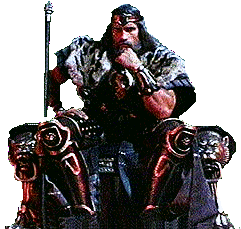
|
Those who’ve been asked for the definition of a ring-giver have answered with a dumbfounded facial expression, “Does it have anything to do with the movie Lord of the Rings?" Or others might simply think that the word "ring-giver" basically means a person who gives out rings. This word can be considered a vague term because it might sound like it has one implication, but in fact, it actually has a deeper meaning. During the Anglo-Saxon period, the word "ring-giver" is also labeled as a kenning, which is an extended metaphor. It simply turns ‘ring’ into a metaphorical term. The word “ring-giver” really means the king or overlord. However, there is more to the definition. The soldiers, or men who returned home from fighting for their king or land, would receive valuable charms from the king or overlord, such as arm-rings or neck-rings. In this case, the king is known as the ‘ring-giver’ because he distributes priceless gold only to those bold men. In other words, ring-givers distribute wealth for special purposes. The arm-rings and neck-rings distributed by the ring-giver are a reward for warriors’ enormous courage and strength. The brave heroes, who show off their arm-rings and neck-rings in public, eventually make the others jealous of their courage and values. Therefore, the heroes guard these precious jewels with their life. In Beowulf, edited by Joseph E. Tuso, the epic begins with a depiction of the good king -- Scyld. Scyld and his son, Beow, are known as the ring-givers in Beowulf: “a young man ought by his good deeds, by giving splendid gifts […], to make sure that later in his life beloved companions will stand by him, that people will serve him when war comes” (1). As the epic continues, we note that when Scyld dies, he is sent out to his death to his burial by water, in a “ring-prowed ship” (Tuso 1). He is provided with many great treasures in his voyage into the sea. In other words, Scyld’s death, his going down into the horizon, will be countered by the repeated pattern, which means that his son, Beow, will take over for him and live again in recognition. Beow brings people close to him, ready to tell his story, by his gifts, especially the gifts of the rings. Scyld and Beow are not the only two ring-givers in Beowulf. Hrothgar, the king of the Danes and a wise and aged ruler, is another ring-giver in this epic. King Hrothgar commands his men to construct a meadhall larger than anyone can imagine and names it Heorot. After Heorot is beautifully finished, Hrothgar “did not forget his promise: at the feast he gave out rings, treasure” to those men who have helped with the building (Tuso 2). In addition, when Beowulf comes to protect King Hrothgar and his village from Grendel, King Hrothgar promises to “recompense [Beowulf] with rich treasure” as soon as he returns from his battle with Grendel. Therefore, King Hrothgar is another well-known ring-giver among his people. This ring-giver role is quite a traditional position during the Anglo-Saxon era.
Knowing the general meaning of a “ring-giver” and learning about other Anglo-Saxon terminologies will definitely help readers to understand more about that period. If one reads a classic Anglo-Saxon epic, such as Beowulf, without realizing the meanings and stories behind the specific terms, then the individual will eventually lose interest in that particular piece of writing. Hence, the understanding of exceptional words is extremely essential when reading the Anglo-Saxon literature.
|
